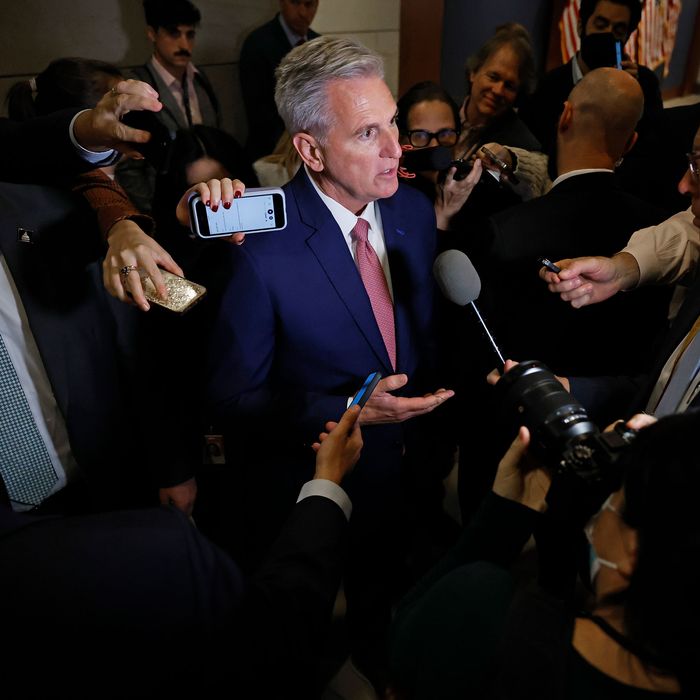
The first skirmishes of the civil war to define the future of the Republican Party were fought this week across the sprawling corridors of the Capitol. With Donald Trump’s verbose announcement speech serving as an intermission, the leadership contest among House Republicans on Tuesday and Senate Republicans on Wednesday marked some of the initial cleavages within the party in the aftermath of a disappointing midterm election.
Yet, unlike past intraparty wars, the battle lines are convoluted. This is not a simple fight between the Establishment and the Tea Party or between Trumpers and Never Trumpers. Instead, the party is splintered not just by ideology but also by allegiance to Trump, which is under new strain. The result has been akin to a party full of warlords, each with seemingly divergent alliances to each other.
The chaos was on display Tuesday, when an overwhelming majority of House Republicans voted to choose Kevin McCarthy as their nominee from Speaker by a margin of 188 to 31. That led two Trump foot soldiers to take entirely different views of what it meant to be MAGA on Capitol Hill.
As soon as the vote ended, Matt Gaetz appeared before reporters to bash McCarthy before he could take a victory lap. “Kevin McCarthy couldn’t get to 218 votes today. Couldn’t get to 200. Couldn’t get to 190. So to believe that Kevin is going to be Speaker, you have to believe that he’s going to move votes in the next six weeks that he couldn’t move in the last six years,” he said, referring to the next step in the process when the entire House will vote for Speaker in January, with a majority of 218 votes required to win.
Even the rosiest scenario for the House GOP would leave them with 222 seats, which means any five dissenting Republicans could torpedo McCarthy’s candidacy. The hard-right Freedom Caucus gathered 31 such votes behind their stalking-horse candidate, Andy Biggs, whom Gaetz supported.
Eventually, McCarthy — who Trump endorsed for Speaker — appeared for a press conference to express absolute confidence that he would take the gavel from Nancy Pelosi. As the bright television lights glared against the backdrop of a half-dozen American flags, he uttered platitudes designed not to alienate a single vote, such as “I respect each and every member of the conference, and I respect them equally.”
When McCarthy and his leadership team walked away, another die-hard Trump supporter appeared from down a hallway with one clear message: Not only should he become Speaker, said Marjorie Taylor Greene, but she couldn’t see any reason why a Republican would not vote for him on the House floor.
While Trump diehards were divided on McCarthy, there was no such clear division when it came to supporting Trump, who announced his 2024 campaign hours later. Some members of the Freedom Caucus like Bob Good of Virginia and Byron Donalds dodged questions about whether they wanted Trump back, while others who are less ideologically pure were gung ho. Elise Stefanik, a comparative moderate from upstate New York turned into a zealous Trump defender, preemptively endorsed him for president. So did Jeff Van Drew, a former Democrat who switched parties in 2019 after opposing the first Trump impeachment.
The GOP schism became even more confused on Wednesday morning when Senator Rick Scott mounted a quixotic effort to oust Mitch McConnell as Republican leader in what was the first contested vote for the position in over 25 years. Although McConnell has become Trump’s bête noire, the former president is prone to sending out statements attacking the longtime leader as an “old crow” and lobbing racist attacks at McConnell’s wife, who served in Trump’s cabinet. Longtime right-wing Senate gadflies like Ted Cruz and Rand Paul voted against McConnell, but so did Lindsey Graham, a traditional Republican who has become a Trump confidante after opposing him throughout the 2016 presidential election. Yet none explicitly supported Trump’s reelection bid in 2024. The only senator to do so was Tommy Tuberville, who backed McConnell.
The GOP may sort itself into neater ideological camps in the years to come with a meager and fractious majority in the House vying for power while a host of presidential candidates try to take down Trump. For David Schweikert, a Freedom Caucus member, the situation was not that complicated. “This is just the dance of politics,” he told reporters on his way into the leadership vote on Tuesday. “This is the way it works. This is the ability to say my leverage is ‘I have a vote, will I get listened to?’”





























